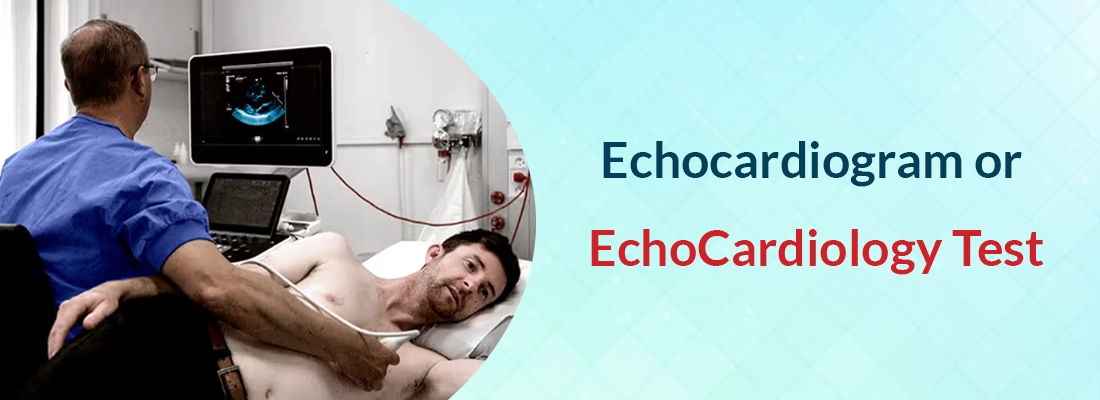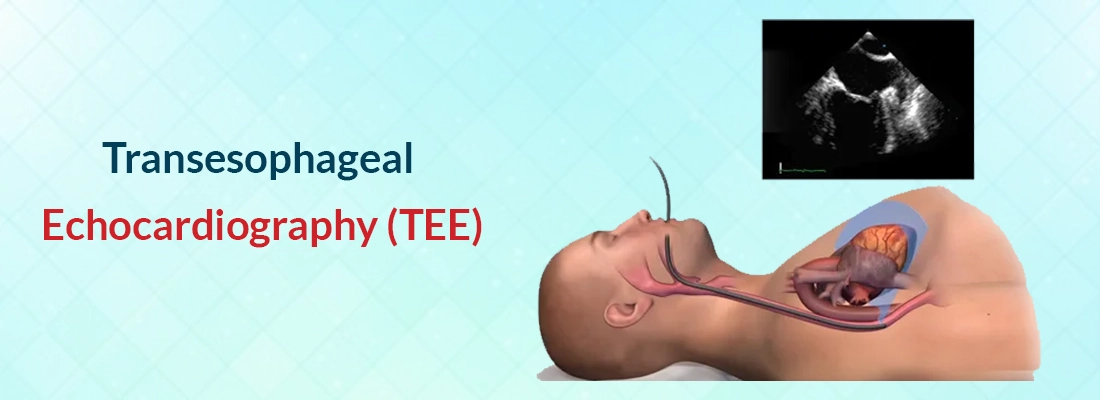
Patients having heart diseases or those who are suspected to have one often face a battery of tests and scans.lets discuss about a few tests that could possibly happen if you have a certain disease.
There are a lot of test names you may hear when you visit your cardiologist, but what are all these tests and why would you need them? We will understand it here.
Echocardiogram or Echo Cardiology Test

Echocardiogram uses sound waves to produce images of your heart. This test allows the physician to see how much your heart is beating and how much blood is moving though your heart.Cardiac echo scan images are used to identify various abnormalities in the heart such as in heart muscles or valves. This test can be done while you're at rest or it can be done while you are exercising to elevate your heart rate, when the Echo is done this way it is known as Cardiac stress test or also known as Treadmill test (TMT test) or Echo TMT.
Why You Might Need An Echo Test?
- When you have atherosclerosis, gradual clogging of arteries by fatty materials and other substances in the bloodstream, leading to problems in the wall motion or pumping function of your heart.
- Cardiomyopathy or enlargement of heart size due to thick or weak heart muscle
- In detecting congenital heart diseases such as ventricular septal defect
- For further evaluation of sign and symptoms of heart failure
- Aneurysm evaluation
- Detecting cardiac tumour
- Evaluating signs and symptoms of pericardial effusion or tamponade.
- Determine the cause of a heart murmur.
- Check the function of heart valves
Transesophageal Echocardiography (TEE)

TEE uses high-frequency sound waves (ultrasound) to make detailed pictures of the inside of your heart and the arteries that lead to and from it. The Echo transducer that produces the sound waves for TEE is attached to a thin tube that passes through your mouth, down your throat and into your oesophagus, which is very close to the upper chamber of the heart
Reasons for the TEE Test?
- Assess how well the heart’s chambers, valves, and blood vessels are working, for proper blood flow through the heart
- Check for blood test for clots in the heart, to guide treatment for atrial fibrillation, a type of arrhythmia (abnormal heartbeat)
- Check for structural abnormalities in heart valves and chamber walls
- Guide the positioning of catheters in many diagnostic and treatment procedures
ECG or Electrocardiogram
ECG measures the electrical activity of the heartbeat to provide two kinds of information.first, the duration of the electrical wave that passes through your heart can be a measure of the time intervals on the ECG. By knowing how long a wave takes to trave from one part of the heart to another shows if the electrical activity is normal, slo, fast, or irregular. Second , by measuring the amount of electrical activity passing through your heart muscle, a cardiologist may be able to find out if parts of the heart are too large or overworked.
- To look for the cause of chest pain
- To identify irregular heartbeats
- To see how an implanted pacemaker is working
- To determine how well certain heart medicines are working
- To evaluate problems which may be heart-related, such as severe tiredness, shortness of breath, dizziness or fainting.
- To help determine the overall health of the heart before a procedure such as surgery or after treatment for conditions such as heart attack (myocardial infarction. Or MI), endocarditis ( inflammation or infection of one or more of the heart valves), or after heart surgery or cardiac catheterization.
- To get a baseline tracing of the heart's function during a physical exam, this may be used as a comparison with future ECGs, to determine if there have been any changes.
Magnetic resonance imaging (MRI)
_1706705471.webp)
MRI uses a magnetic field and radiofrequency waves to create detailed images of internal organs and structures inside of your body. It can be used to examine your heart and blood vessels and to identify areas of the brain affected by stroke.
Reasons For Doing MRI
- Assess the function of the heart valves
- Congenital heart disease diagnosis
- Heart failure reason
- Assess damage from a heart attack
- See Inflammation of the membrane around the heart (pericarditis)
CT Scan (Computerised Tomography)
When cross-sectional images are produced in a X-Ray imaging technique with the help of computers.also referred to as cardiac computed tomography, computerised Axial Tomography or CAT scan, it can be used to examine your heart and blood vessels for problems. It also used to identify whether blood vessels in the brain have been affected by stroke.
Reasons for doing CT Scan
- Congenital heart disease, or birth defects in the heart
- Buildup of a hard substance known as liquid plaque that may be blocking your coronary arteries
- Defects or injury to the heart’s four primary valves
- Tumours in or on the heart
- Blood clots within the heart's chambers
Why Ganesh Diagnostic and Imaging Center For Your Heart?
Ganesh Diagnostic Centre is an established and renowned diagnostic centre since 2001.
We have many X-rays which can offer report Images online as well. We also offer FLAT 50% OFF on many Scans.
Their excellence is backed by NABH and NABL Accreditations
NABH accreditation is proof of the highest standard of care and service provided to the patients. NABL accreditation reflects the competency of laboratories and equipment based on some national and international standards.
We are known for providing excellent service and care to its patients for decades having created Lakhs of satisfied patients over the years!
Ganesh Diagnostic and Imaging Centre is a one-stop solution for getting all kinds of diagnostic Scans done, as all services are available under one roof.
GDIC aims to provide the world’s advanced technology at the most reasonable and lowest price.
The rates of scans are reasonably priced. Patients can rely upon scan Image reports as reports are 100% accurate.
For Free Consultation From The Doctor
Get connected to our doctor directly-
- Dr. Ravin Sharma MBBS, MD Radiology)
- Phone Number- 9212125996
- Available- 24*7*365
Book Your Online imaging and Get Early Appointment
Ganesh Diagnostic Center promotes great care and concern for patients.
It is our utmost duty to allow a speedy diagnosis and hope that in future, your treatment is done at the earliest.
Thus, we recommend you to book an appointment with us today and book your online diagnostic imaging scan for any specific disease, disorder and discomfort.
Avail our digital support system and establish a long lasting relationship with Ganesh Diagnostic Center near you today.
Note from Ganesh Diagnostic & Imaging Centre
Early checkups are always better than delayed ones. Safety, precaution and care are depicted in the several health checkups at our centre. We are the Nearby imaging centres at your service.
Here, at Ganesh Diagnostic and Imaging Centre, we present simple and comprehensive healthcare packages for any kind of diagnostic scan to ensure the early prescribed treatment to safeguard your health.
Find the Best Diagnostic X-Ray Or Scanning Near you and get your Imaging done at the earliest.
So, visit us at the earliest to ensure good health and to maintain an active lifestyle.
Frequently Asked Questions
What are the best tests for cardiac patients?
Besides blood tests and general physical examinations,and the conventional Chest X-Ray there are certain tests to diagnose heart disease which include-
- ECG or EKG (electrocardiogram)
- Holter monitoring
- Echocardiogram
- TMT
- TEE
- CT Heart
- Heart MRI
What is the most detailed heart Test?
CAT scan or the CT scan is the best diagnostic test that is capable of producing detailed pictures of your heart and its blood vessels. Computers can combine these pictures to create a dimensional (3D0 model of your whole heart. Ct scan is a painless, non-invasive imaging test that uses X-Rays to make detailed pictures of your heart.
What is a 24 hour heart Test known as?
The Holter Monitor is a type of portable ECG test. It is capable of recording the electrical activity of the heart continuously over 24 hours or longer while you are away from the doctor's office. A standard resting ECG is one of the simplest and fastest used to evaluate the heart. Electrodes are placed on some body parts such as the chest and abdomen. The electrodes are also connected to an ECG machine by wires. Then, the electrical activity of the heart can be measured,recorded, and printed. No electricity is sent into the body.
What test is for Cardiac Pateints?
Electrocardiogram. An electrocardiogram (ECG) is a test that records the electrical activity of the heart. The ECG reflects what's happening in different areas of the heart and helps identify any problems with the rhythm or rate of your heart










